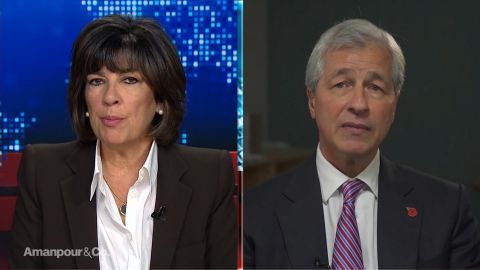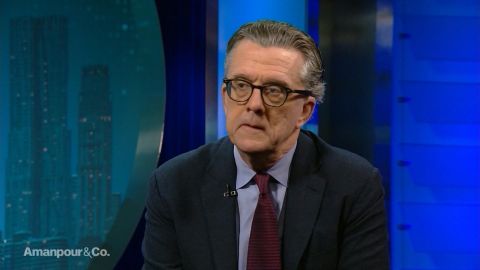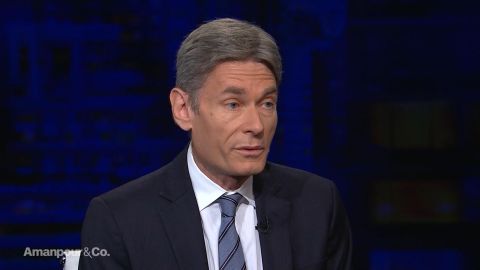Read Transcript EXPAND
CHRISTIANE AMANPOUR: Kurt Anderson is the Peabody Award winning host of the radio show “Studio 360.” He’s also a best-selling novelist. His book “Fantasy Land: How America Went Haywire,” explores reality to illusion from the Salem witch trials in the late 1600’s to Donald Trump in 2016 and he spoke with our Walter Isaacson about finding truth amid the blurry lines.
(BEGIN VIDEO)
WALTER ISAACSON: Kurt, thank you for joining us.
KURT ANDERSEN, AUTHOR: My pleasure.
ISAACSON: So the elections, did that show us, a divided nation getting even more divided?
ANDERSEN: I think that’s fair to say. I mean I get deeper in the weeds to find more interesting canter examples of we’re not bifurcating into an even more sort of separate reality country and there are examples of that. But yes, I think the urban and suburban versus rural split is pretty much clearer than ever. And, again, the fact that we are versus rural split is clearer than ever. And, again, the fact that we are more dysfunctionally split even though I think the democrats winning the House is good for the democrats but it’s also good for democracy not to have a single party in control especially under this president. But I think the idea of there being any kind of bipartisan new era of governance starting. That’s a myth – an impossibility for at least a couple more years.
ISAACSON: You know your book, “Fantasy Land” talks about this from the Salem witch trials to the present and it seems to go in flows sometimes, this paranoia, resentment, and then the fever breaks.
ANDERSEN: Yes.
ISAACSON: What would cause a fever to break this time?
ANDERSEN: That’s – well that’s what worries me most as I’d spent years researching and writing “Fantasy Land” and even though I had been a kind of optimistic believer in this cycle of American history; we go right, we go left, we go more status, we go more free market. Looking at the history of the last 40 or 50 years, I see it – I see the pendulum just going and continuing to go in one direction. And so that’s what I worry. I worry that the new conditions of the internet, of cable news and partisan news media more generally are new conditions that – that I’m not sure we go back to normal anymore.
ISAACSON: One of the things that made it so that we didn’t have these totally separate realities, we often had a common pool of information. We grew up with a Walter Cronkite saying, “That’s the way it is.” Structurally with the internet and with cable news now, is that something that we’ll never return to?
ANDERSEN: Well that’s my worry – that’s exactly my worry. And – and, you know, it’s the chicken and the egg problem. As we had more sources of news, and that wasn’t all together a bad thing. There was lots of complacency and elitism and sexism and all kinds of things that were a problem when two news magazines and three networks and a newspaper or two ran the show of information. But no, I think – I think that pendulum swung too far the other way where now people are able to have their own fully apparently true reality on the internet, on talk radio, on television news that really reinforces whatever they wish to believe. So it’s not even confirmation bias as the psychologists talk about. You look for things to reinforce what you already believe and, therefore, you keep believing them. That always has existed. This is a new situation where people are more able than ever to not just believe — have their opinion but to believe their opinions are facts and to fail to see the difference between fact and opinion.
ISAACSON: Do you think some people have just given up on believing that the truth is the truth?
ANDERSEN: I do think that that is the big problem, that is the big problem that I examine – that I discovered really in writing “Fantasy Land” and it hasn’t happened overnight. It’s been a – it was always part of the American character and habits of mind that we’re pretty procurely(ph) American for a long time, but it did slide back and forth and the grown-ups were pretty much in control for a few centuries until for the last 50 years they got out of control and thanks to new technologies and all that happened in the 1960s and everything, the idea of empirical reality and belief in science and reason came under challenge. And Donald Trump, as nobody before him had done in that position of authority and power exploited it and is exacerbating it. To me it’s the biggest problem. It’s the extensional as you suggested earlier, once we no longer share a set of facts about, is the climate of the earth warming or not, for instance, or is there a dangerous caravan of MS-13 people heading our way? Once we really don’t have the same set of facts, how do you run a democracy? How do you run a society?
ISAACSON: How of does this stem from reality TV which Trump comes out of that world in which the distinction between reality and fantasy is so blurred.
ANDERSEN: Reality TV and its emergence around the turn of the century, around 2000 is a big part of this. It’s both symptom and cause, a symptom of this ongoing blurring of fiction reality which had been going on for decades if not centuries in this country and in this country especially. But then, it encourages in the case of Donald Trump who played a successful businessman on television for 15 years, initially with very, very high ratings, it encourages people to believe that and nominate him for president and elect him president.
ISAACSON: And do you feel democrats will now become part of the show, too now that they have the committed gavels and say let’s join this reality TV show?
ANDERSEN: Well of course. I mean we all – all Washington politicians have become part of the show over the last few decades and with cable news, with partisan cable news and so forth. So sure they’re going to be part of the show, but if politics has become a show and you’re the out of power party, you have no choice but to become part of the show. Now you want to maintain your tether to reality as much as possible, which I hope the democrats will do.
ISAACSON: When you see TV news anchors like Sean Hannity or Judge Pirro, I think her name is, go on stage and be part of a political rally, is that fitting into your concept of how we’re losing the distinction of what the press should do?
ANDERSEN: Well it is certainly a new condition or, in that case — I mean, I think it’s awful and I think the fact we’ve lost those — another set of norms about what journalists should and shouldn’t do is — is bad news, but we’re also reverting to the way the U.S. press used to be. In the 19th Century and the 18th Century, almost all newspapers and publications were partisan rags. The Wigs had this paper and the Federalists had this paper and that’s the way it was. And the late 19th century and through the 20th Century though there was still partisan news and Henry Lewis at times still had his political opinions, this set of norms about what the news media should be, which is to say fair-minded in their search for the truth, obtained and the idea of, yes, Walter Cronkite, you know, campaigning for or against Richard Nixon is an insane idea but here we are.
ISAACSON: You know, the notion of fake news existed when people were totally making up articles or Russia was making up articles and planting them and Trump appropriated that to make the mainstream media fake news. Then you had Sean Hannity even going on stage and pointing at reporters and saying fake news. Does that help undermine the concept of truth?
ANDERSEN: Absolutely. That is the problem. That is the totalitarian playbook. It’s what Hannah Arendt talked about in the “Origins of Totalitarism” back in the early `50s, talking in that case about Stalin and Hitler. It’s what Putin does. Oh, who knows what’s true? They say this is true. They say that’s true. You can never know what’s true.
ISAACSON: Based on Hannah Aaron’s book, Michiko Kakutani wrote “The Death of Truth.” It echoed your book, “Fantasy Land,” and that seems to be the underlying issue here in this election which is people having no concrete notion that the truth is the truth.
ANDERSEN: If republicans were winning on the basis of arguments or even emotional appeals that were not based on falsehood, then, you know, the democrats could say, well, they won, they made a better case, whatever, or they appealed to bigotry. But when it’s really based on untruths about either, you know, election tampering or untruths about democrats of various kinds or this caravan, then I think — I don’t think that’s been the case as much as it is today, at least in my lifetime.
ISAACSON: In “Fantasy Land” and even in your discussions recently, you also point out that the left has wandered into “Fantasy Land” quite often. Do you fear that happening, too?
ANDERSEN: I think we – we — the bullet America missed, whether you’re democrat or republican, is undermining the sense of legitimacy of our democracy, that that didn’t happen. So I think the fact that they now have this big lever of power running the House in Washington, will serve to keep democrats and democratic voters ensconced in reality and the reality based community where they have been much more than republicans the last 20 years as republicans have gone off the rails.
ISAACSON: But do you think the country is hungering for a message of people who want to unify us, or are they looking for resistance?
ANDERSEN: It would be nice to say unity. So I do think if you asked people, is there too little unity and too much divisiveness, 83 percent would say, would answer yes. But our people in the short and medium term willing to do what’s necessary to make that happen? I don’t think so and to me the message of this election is that people are hunkering down in their bunkers.
ISAACSON: Thanks for being with us. Appreciate it.
ANDERSEN: My pleasure.
About This Episode EXPAND
Christiane Amanpour speaks with Congressman-elect Tom Malinowski, Chairman and CEO of JPMorgan Chase Jamie Dimon, and Prime Minister of Canada Justine Trudeau. Walter Isaacson speaks with journalist Kurt Andersen.
LEARN MORE



